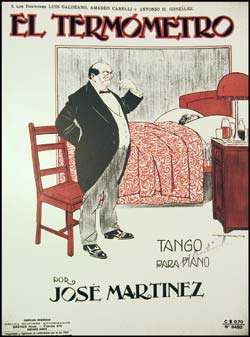By
Fever, penicillin, madness and tangos

ever, called the «queen of symptoms», according to ancient Vedic medical texts, arose because of the anger of the god Siva.
In Roma, on the Quirinal hill there was, among others, a temple built to the deity Febris. We must take into account that Februus, the god of purification, and also of fever, was a god of Etruscan origin that later was identified with Pluto.
February is, etymologically, the month of fever. It comes from the Latin «februarius», from «februare» (make amends, atonement), and these words come, equally, from «febris» (fever) and from «fervere» (boil).
Let us say now, that by associating it with the rising body temperature and putting aside all kinds of sexual connotations, that «calentarse» is being worried; «calentura» is anger, enthusiasm, fervor, and that a «calentón», is one who gets angry «engrana» easily and quickly. And «pasar calor» or «lorca» or simply a «verano», is to be embarrassed which is evidenced by a quick blush on one’s face.
But as a loutish Latinist used to say while he listened to the Humberto Canaro’s tango “Fiebre”: «Non calentarum, largo vivirum».
 And as any fever profile demands its temperature to be known, let us switch now to the thermometer. The invention of the clinical thermometer in the early seventeenth century by Sanctorius, professor of physiology at the famous school of medicine in Padua, opened the road to a systematical study and outline of fever. More than a century passed before some physicians furthered that practice, and three centuries later, when its use was customary, José Martínez dedicated a tango piece to it in 1917.
And as any fever profile demands its temperature to be known, let us switch now to the thermometer. The invention of the clinical thermometer in the early seventeenth century by Sanctorius, professor of physiology at the famous school of medicine in Padua, opened the road to a systematical study and outline of fever. More than a century passed before some physicians furthered that practice, and three centuries later, when its use was customary, José Martínez dedicated a tango piece to it in 1917.
There are words that may be in vogue by keeping their original meaning and, after some time of being used, be forgotten to reappear later with another or other meanings. Such is the case of the word “mufa”.
Muff, that in German means mildew, mushroom, fungus, entered the Italian language transformed into muffa and meaning the same. From this latter language we have inherited it and, since then, la mufa developed among us changing its sense many times.
We started to use it not only to designate mildew but also a certain kind of state of mind or mood, a comedown, a mild depression. With this figured meaning —which maybe comes from the association of ideas between mildew and the fact of getting moldy— the term mufa became popular.
As from 1960, approximately, this word experienced a revival, by change of meaning, switching to denoting anger, bad humor, annoyance; later it began to be identified with apathy, tedium, boredom, to later end up becoming equivalent to misfortune, bad luck. And in this sense it has been lucky. Mufa materialized in el mufa and finally displaced el yeta, el jettattore, el fúlmine and el semáforo, (different ways of naming hoodoos, people who bring bad luck) which is fairly successful.
 As mildew gave rise to the word mufa, let us remember that also a fungus, the one known as Penicillium notatum, was the source of the first antibiotic, whose properties were discovered by Alexander Fleming in 1928.
As mildew gave rise to the word mufa, let us remember that also a fungus, the one known as Penicillium notatum, was the source of the first antibiotic, whose properties were discovered by Alexander Fleming in 1928.
Since medicine is the most oral of all professions, we, the doctors, must not reject the knowledge of popular terms and expressions, especially those who still believe in the magic of words, because many times they are useful for us to fit in the context of the doctor-patient relationship.
And if we talk about madness or dementia, let us say that the popular wit, always sane, has not denied its own classification. That is why it makes a difference among these sick people with piantados (those who in some way all of us have inside); rayados and revirados (those who can be aggressive and we must guard against); sonados, chiflados, colifas, colifatos and tocados (who, in general, are harmless), so issuing its own diagnostics and encompassing a whole psychiatric panorama which goes from a far out, a freak to a raving lunatic. This is a psychiatric classification that, even though it is not scientific at all, is useful to detect, at least, certain tendencies and to know with whom we are dealing.
And at this stage, I want to remember a sonnet that I have titled
Sin enroque (Without castling)
Pudiendo ser oblicuo y pendenciero
en su insólito mundo ajedrezado,
nunca participó del entrevero,
ni siquiera comiendo de costado.
Prefirió la quietud de un casillero
donde irónico juego le fue dado.
Él, que buscó ser libre en el tablero,
se vio en un laberinto confinado.
Fue entonces que atacó y quedó pagando.
No vio a esas piezas blancas aguardando
y enfurecido se largó al combate.
Lo dejaron venir... Lo acorralaron...
De movida nomás, lo enchalecaron...
y en el Borda le dieron jaque mate.